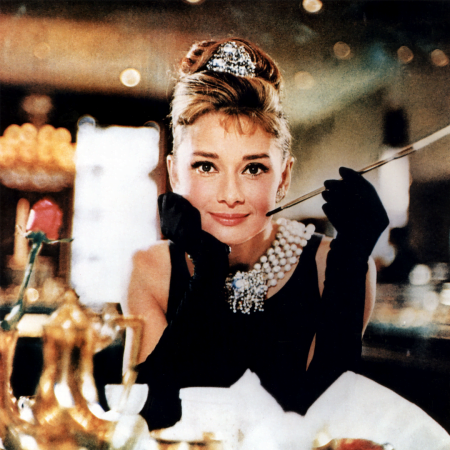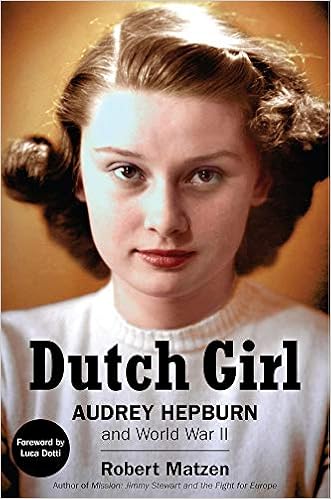
Join our mailing list for the latest news on Mobituaries, plus receive recommendations and exclusive offers on all of your favorite books and authors from Simon & Schuster.
By clicking “Sign Up” I acknowledge that I have read and agreed to the Privacy Policy and Terms of Use.
Join our mailing list for the latest news on Mobituaries, plus receive recommendations and exclusive offers on all of your favorite books and authors from Simon & Schuster.
By clicking “Sign Up” I acknowledge that I have read and agreed to the Privacy Policy and Terms of Use.
“I was right behind the counter when when she, and by she, I mean Audrey Hepburn walked, floated by my counter.”
Mo Rocca will never forget the moment he first crossed paths with Audrey Hepburn. He was a young college graduate getting his start in New York City as a fragrance specialist at Macy’s. One April day, Hepburn entered the store as part of the annual flower show.
Mo reunited with his former colleagues at Macy’s to recall the day when the world seemed to come to a stop. Mo’s boss at the time, Javan Bunch remembers that “there there was this reverence among everybody on the floor. No one would have tried to get that close.” This concept may seem unimaginable to the selfie generation but Mo insists: “you never would've thought to like wrap your arm around her and put your, shove your hand in front of her face.
This Mobit is more a series of vignettes, rather than a womb-to-tomb biography as Mo tries to understand why more than twenty-five years after her passing, Audrey Hepburn seems more popular than ever.
Along the way, he revisits interviews with Audrey fans like the late Nora Ephron who spoke about her unique appeal: “There was no one like her, ever. The charm, was who she was. I’ve never seen anything like it.”
Mo noticed this first hand when he tweeted: "How did we drift so far from Audrey Hepburn? Can we ever get back?” The feedback was intense.
Hepburn’s older son Sean Hepburn Ferrer explains to Mo that his mother was not the typical movie star from Hollywood: “Audrey Hepburn is the young girl from across the landing who puts on a little black dress and goes out into the world and she represents us, not them. And we're rooting for her.”
Somehow she manages to be both aspirational and totally accessible in her films and real life.
Johnny Carson and Ed McMahon also gushed about Hepburn on “The Tonight Show” in 1976. The normally unflappable Carson admitted he was nervous and described her as “delicate.”
Ferrer notes that Hepburn would have smirked at that description because of what she had endured through her life, particularly in her youth.
Hepburn was born in Brussels, Belgium on May 4, 1929. Her father was a banker and her mother a Dutch aristocrat.
She spent some of her youth in the United Kingdom, where she trained as a dancer, and where her parents were supporters of the Fascist movement. After her father abandoned the family and as war loomed, Audrey moved with her mother to neutral Holland. Soon after the Nazis invaded.
In spite of her parents’ pre-war politics, as a young teenager Audrey, did what she could to help the resistance, like raising funds through secret dance performances.
Her hometown of Arnhem, Holland became a World War II battlefield and many citizens, including Audrey’s family starved during the Dutch Famine.
Hepburn recounted her wartime experience during her U.S. television debut on the program “We the People” in 1951. Surreally, she re-enacted one Christmas in 1944, when the family ran out of food: “Well, I’d heard one could sleep and forget hunger. Perhaps I could sleep all through Christmas. I’d try.” While the program ended on an upbeat note, with the delivery of potato rations, the war had a lasting impact on the Oscar winning actress.
Hepburn’s younger son Luca Dotti explains that his mother suffered from severe malnourishment at the end of World War II, weighing only 88 pounds. Dotti tells Mo that the stress of the war stayed with his mother the rest of her life but she hid it well. “My mother was then a survivor and when you are you are, you always have this duality. You are happy to be alive but you have this sense of guilt because the person next door didn’t make it.”
As part of the episode, Rocca also discusses Hepburn’s connection to Anne Frank. Though they never met, Dotti called them “soul sisters.”
In a 1989 CBS News interview, Hepburn revealed: “I read the diary in Dutch, in galley form, when it was still being edited. And it was one of the most devastating experiences I’ve ever had. Because more than just reading a book, it was like having the whole war played back to me.”
Anne Frank’s father, Otto Frank tried to convince Hepburn to play the part of his daughter on the screen but she turned down the part. “She thought it would kill her,” explains Hepburn’s older son Sean Ferrer. “She actually believed that it would somehow, you know, kill her to do it because she felt so close to her and she was crushed that she made it and Anne Frank didn't.”
Mo got to wondering if this combination of yearning and gratitude is what still draws us to Hepburn both on, and off the screen. Luca Dotti agrees that “it did show. It did show through her eyes, it did show in her genuinity and simplicity.”
It certainly showed to her Japanese fans, among the most enthusiastic in the world. Mo spent some time in Japan in the early 1990s and noticed the Audrey love was deep. Taki Katoh was a show business coordinator in Japan, who remembers the fascination with Hepburn in “Roman Holiday”: “For us she was so cute, and Japanese tend to like someone who is cute.” Hepburn’s pixie haircut in the film became so popular that women the country over, imitated the style. However, Katoh was not only an early admirer of Hepburn’s, she also worked with her in the early 1970s, when Hepburn participated in a Japanese ad campaign for fashion wigs. They stayed friends for the rest of Hepburn’s life. In a letter to Katoh, Hepburn fondly recalled a visit to Japan in 1983 where she clearly returns the Japanese love: “None of us will ever be the same again.”
Hepburn’s fan base even extended to the White House. President Bill Clinton admits to Mo that he loves films like “Roman Holiday,” “Sabrina” and “Funny Face.” However, he didn’t realize that the iconic star died the same day as his first presidential inauguration on July 20, 1993:
Mo Rocca: You didn't know that?
PRESIDENT CLINTON: No.
MO ROCCA: You did not know that.
PRESIDENT CLINTON: I didn't reg-- look, I didn't-- it was a fairly busy time. I didn't sleep for two days….She was only 63. Yeah, I remember that. I remember how, like, young I thought she was. I didn't think about it, being my inaugural day.
The inauguration ended up taking up all the front page space in newspapers the next day. Though she is adored the world over, she did not receive a prominent obituary. Mo caught up with Caryn James who wrote Hepburn’s New York Times obituary.
She shares the story of a Hepburn mix-up: “the deputy culture editor came running over to my desk and said, ‘Thank goodness you're here. Katharine Hepburn is dead and we have a 10 year old obituary. Can you rewrite it?’” The confusion was cleared up soon enough but James still only had a few hours to write a tribute that could stand the test of time. And she did just that, making note of the fact that “audiences were enchanted by her combination of grace, elegance and high spirits.”
The other interesting bit about Caryn: she’s not even an obituary writer! In fact, she has only written two obits in her life: Audrey Hepburn and Katharine Hepburn!
Mo understands it might seem a little weird to feel nostalgic for a time you didn't live through. And yet on those days when the news is particularly dreary and people are being especially awful, and I'm flipping through the channels and I land on one of her movies, he can't help but wonder: "How DID we drift so far from Audrey Hepburn? Can we ever get back?" One can only hope.
Episode Extras
In this rare footage from Audrey Hepburn's American TV debut in December, 1951, the young actress recalls her life during World War II in Nazi occupied Holland. This television appearance was likely the first time American audiences were introduced to Hepburn. At the time, she was starring in the title role of "Gigi" on Broadway.
Audrey Hepburn died the same day as President Bill Clinton's first inauguration (January 20, 1993). Mo Rocca asked the former president if he had been aware of her passing that day.









